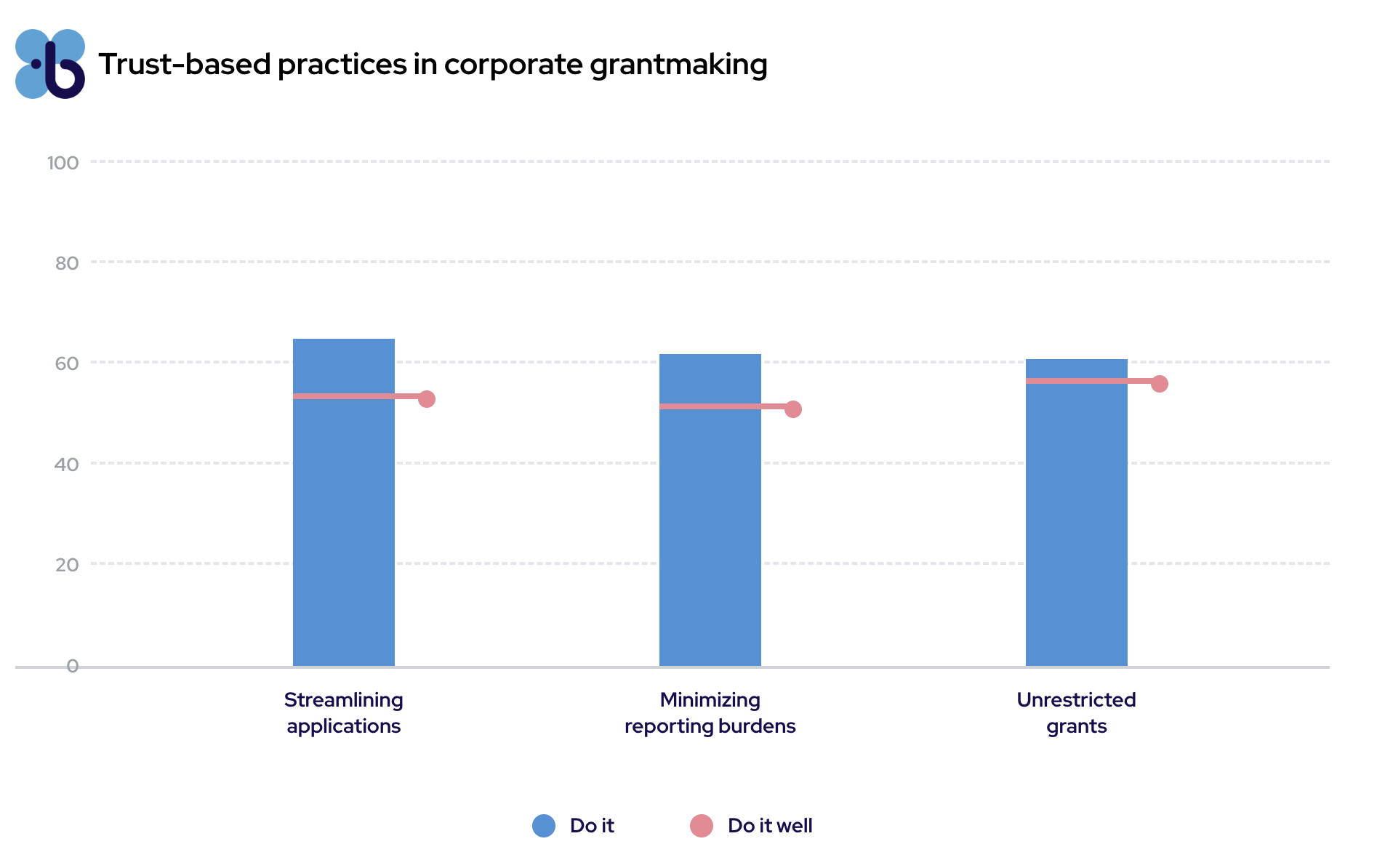Grants can play an important role in nonprofits’ operational budgets. In an ideal world, grants give nonprofits project predictability, the ability to plan long-term and the security of knowing they have a partner in pursuit of their goals.
But some traditional granting practices — such as short-term budgets, overly detailed proposal requirements and heavy demands on reporting — have historically put a strain on nonprofit capacity, not to mention the relationships between funders and grantees. And when grantees are asked to regularly re-apply to the same funding partners, they are likely to feel their budgets are always at risk of disappearing.
New practices are emerging to shift the balance of power between funders and grantees, making relationships more equitable and collaborative. When COVID-19 struck in 2020, many funders recognized the value of nonprofits’ ability to respond quickly to changing needs. Coincidentally, this is also the year that the Trust-Based Philanthropy Project began.
In a recent episode of the Speaking of Purpose by Benevity podcast, host Sona Khosla, Chief Impact Officer at Benevity, spoke with Shaady Selahi, Co-founder and Co-executive Director of the Trust-Based Philanthropy Project, to discuss the organizations’ history and the growth it has seen in its mission in a relatively short time.
What is trust-based philanthropy?
The Trust-Based Philanthropy Project spun out of the Whitman Institute, a foundation “motivated by the core belief that efforts to create social, political and economic equity are more successful when funders proactively work to alleviate power imbalances in the sector by embedding trust, dialogue and relationship-building in their practices with grantees.”
Today, the Project’s goals are to:
- Center equity, humility and transparency.
- Recognize the power imbalance between funders and grantees and work to actively rebalance it.
- Deeply value the quality of relationships, and honor how we treat others on the path to winning on our issues, as much as the act of winning itself.
When trust-based principles are included, corporate granting isn’t just funding nonprofits’ missions, it is supporting their capacity for innovation, skill-building and reporting. This investment in nonprofit resilience was one of the key trends identified in the Benevity Impact Labs 2025 State of Corporate Purpose Report, as community improvement and capacity building became the fourth-biggest focus of corporate granting in 2024.
And the benefits aren’t all in favor of nonprofits — corporate grantmaking teams are seeing them too. The most recent report from Benevity Impact Labs, The Grants Confidence Gap, found that grantmakers report higher levels of confidence in their practices when trust-based principles are included.

The six grantmaking practices that make up trust-based philanthropy
From the Trust-Based Philanthropy Project:
- Give multi-year, unrestricted funding: Give grantees the flexibility to assess and determine where grant dollars are most needed, and allow for innovation, emergent action and sustainability.
- Do the homework: Make it the funder’s responsibility to get to know prospective grantees, saving nonprofits’ time in the early stages of the vetting process. Choosing the right corporate social responsibility software can help — the Benevity nonprofit due diligence process validates nonprofits to help mitigate legal, financial and reputational risk.
- Simplify and streamline paperwork: Streamline approaches focused on dialogue and learning to pave the way for deeper relationships and mutual accountability.
- Be transparent and responsive: When funders model vulnerability and power-consciousness, it signals to grantees that they can show up more fully.
- Solicit and act on feedback: Grantees and communities provide valuable perspectives that can inform a funder’s strategy and approach.
- Offer support beyond the check: Responsive, adaptive, non-monetary support bolsters leadership, capacity, and organizational health.
How Cisco Foundation helps support nonprofit impact reporting
The Cisco Foundation is a prime example of a funder offering transparency and support beyond the check. In 2015, they set the ambitious goal of positively impacting 1 billion lives, the measurement of which was real and rigorous — impact needed to be clearly proven for it to count. And importantly, the burden of proof was not placed on the nonprofits they partnered with.
Charu Adesnik, Executive Director of Cisco Foundation and Director of Social Impact and Innovation for Cisco Systems, joined the Speaking of Purpose by Benevity podcast to discuss the upfront work that Cisco does to ensure their foundation, the nonprofits they work with and the programs they are funding are all set up for success long before the grant is processed.
After achieving their goal of 1 billion lives impacted, Cisco Foundation is celebrating their 40th anniversary by setting a new goal — supporting 40 local communities around the world with their technology, government affairs partners and more, to make a sustained, deeper impact at the community level.
How Vanguard Group and the Free Library of Philadelphia Foundation work together to make an impact
Partnership is at the heart of great funder-grantee relationships. On another recent episode of the Speaking of Purpose podcast, Sona explored how a great partnership can take grantmaking beyond traditional philanthropy. Her guests were AJ Jordan, Head of Community Stewardship and President of the Vanguard Group Foundation, and Jenny Bogoni, Chief of Community Engagement and Public Programs at the Free Library of Philadelphia Foundation.
During the episode, they discuss how their organizations work together far beyond funding. A trusting relationship allows them to ask each other questions, share networks and connections, and ideate together on how to move projects forward.
The benefits of granting with trust-based principles
Proponents of traditional philanthropy may see unrestricted, multiyear funding as a lack of accountability — that you just give money away and don’t know how it’s being used. The opposite is true. In trust-based philanthropy, communication and collaboration between funders and grantees is often more committed and solutions-oriented. And the benefits go both ways.
For grantees, trust-based philanthropy allows them to:
- Be responsive to the needs of their community rather than the demands of their funders.
- Act during times of unpredictability.
For funders, it allows them to:
- Have better insight into what is happening in communities and where the needs are.
- Positively impact business goals, like attracting and retaining the best talent and seeing measurable boosts to brand reputation.
Learn more about how grantmakers and CSR leaders are leading with purpose by listening and subscribing to Speaking of Purpose by Benevity.









